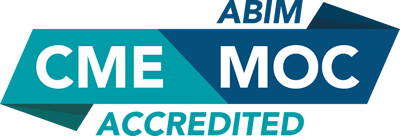
COURSE CREDITS & HOURS
16 AMA PRA Category 1 Credits™16 ACPE Credits
16.0 Contact Hours
16 (part II) MOC points in medical knowledge in the American Board of Internal Medicine's (ABIM) Maintenance of Certification (MOC) program
COURSE FEES
TARGET AUDIENCE
PROGRAM PURPOSE
At any given time, an estimated 55% of the population is participating in a medically managed or self-selected weight-loss program, with the majority of participants failing to lose or sustain weight loss. Of those successful with weight loss, > 60% will regain their lost weight by the end of year one following their initial weight loss success. Fewer than 15% of adults participate in regular exercise and over 65% of adults are sedentary. Lifestyle and behavioral interventions form the foundation for the management of cardiovascular risk factors to achieve improved short- and long-term outcomes, including measures of quality of life.
Hypertension, dyslipidemia, diabetes mellitus, metabolic syndrome and inflammation are the primary modifiable components arising from obesity and overweight. Research has demonstrated that successful management of obesity and overweight requires both sustained lifestyle changes with frequent follow-up as well as the simultaneous medical management of cardiovascular risk factors. The increasing prevalence of obesity and overweight in patients impacts the clinical decisions, management strategies and health outcomes of all health care clinicians, regardless of their clinical specialty. Thus, this conference has been designed with the overall objective to equip healthcare providers with the most current scientific clinical research examining the magnitude of the problem, genetic and environmental causes, pathophysiology, and complications related to the obesity epidemic. This understanding will be translated into the clinical setting throughout the conference with current evidence-based strategies for the practical treatment of obesity and its related comorbidities.
Topics:
- The impact of obesity as a chronic disease on our health care system.
- Examine the pervasiveness of obesity as a chronic disease, the propensity of interrelated co-morbidities, and the impact on health.
- Mechanisms linking excess adiposity to metabolic dysregulation.
- Describe how excess adiposity is linked to metabolic dysregulation.
- Mood disorders associated with insulin resistance and obesity.
- Assess how selected obesity-related complications, such as mood disorders, eating disorders, and sleep apnea impact management strategies.
- Current and future considerations in pharmacotherapy for obesity and overweight.
- Evaluate new recommendations in the use of current pharmacologic agents and the future development of agents for the treatment of type 2 diabetes, obesity, and overweight.
- The role that genetics plays in the obesity epidemic.
- Distinguish the relationship between genetics and environment in the etiology of obesity.
- The efficacy of bariatric surgery and the management of bariatric patients.
- Describe the efficacy of bariatric surgical procedures on the pathophysiology and management of type 2 diabetes and obesity.
- Lifestyle and behavioral strategies and interventions for the management of diabetes, obesity and overweight.
- Examine the interrelationship between physical exercise, diet, intestinal microbiome and the body immune system that underlie rational management of obesity.
Additional Topics under development

























